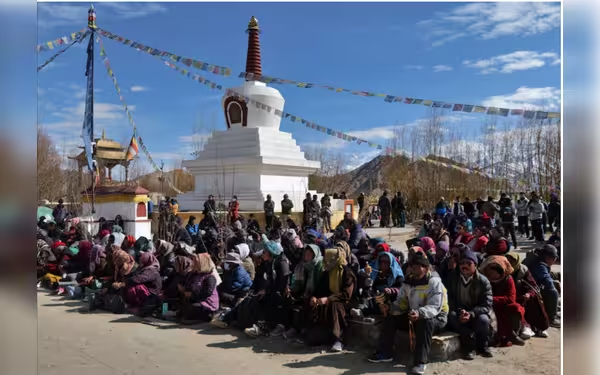Tuesday, July 2, 2024 03:49 PM
Ladakh's Diverse Population Advocates for Statehood and Cultural Preservation
- Buddhist monks and Muslims in Ladakh unite for statehood and cultural preservation
- Ladakh's demand for autonomy and cultural protection faces challenges from the government
- Ladakh's struggle for recognition and self-governance reflects broader themes of self-determination
 Image Credits: tribune_pk
Image Credits: tribune_pkIn Ladakh, a unique blend of Buddhist monks and Muslims advocate for statehood and cultural preservation within India, facing challenges from the government. The region's quest for autonomy reflects broader themes of self-determination.
In the Indian Himalayan region of Ladakh, a unique blend of Buddhist monks and Muslims recently participated in voting to advocate for statehood and the preservation of their local culture within the predominantly Hindu nation of India. Ladakh, with nearly half of its population being Muslim and around 40% Buddhist, stands out as one of the least Hindu areas in the country. Despite their demands, the government, led by Prime Minister Narendra Modi, has yet to address the aspirations of Ladakhis.
Ladakh, a sparsely populated cold desert region bordering China and Pakistan, witnessed voters, including Buddhist monks, casting their votes in Leh, the main town. The region, known for its Buddhist monasteries and memorials to fallen soldiers, has been a focal point of military activity, especially after a border dispute with China in 2020.
Formerly part of the state of Jammu and Kashmir, Ladakh has long sought its own legislature, protection of its unique culture, and measures to safeguard its environment. The decision to separate Ladakh from Indian-administered Kashmir in 2019 did not fully meet the expectations of the local population, particularly in terms of constitutional safeguards.
The demand to include Ladakh in the Sixth Schedule of India's constitution, granting tribal communities autonomy in lawmaking, remains unfulfilled. Candidates in the region, including those from Modi's Bharatiya Janata Party, are pledging to address these concerns and protect the local culture and land.
With extreme winter temperatures and challenging terrain, Ladakh poses logistical challenges for elections, yet it remains a significant constituency in India's electoral landscape. The recent voting in Ladakh is part of India's ongoing election process, marked by calls for greater safeguards and autonomy by local activists and residents.
While Indian-administered Kashmir is gearing up for its first local legislative election post the 2019 changes, Ladakh continues to face governance challenges, with concerns over limited local policymaking authority. The region's quest for full statehood and special protections underscores the ongoing struggle for recognition and self-governance.
Ladakh's journey towards statehood and cultural preservation reflects the diverse aspirations of its people and the challenges they face in achieving autonomy within the Indian political landscape. As the region continues to push for greater recognition and safeguards, the voices of Ladakhis resonate with the broader theme of self-determination and cultural identity in a complex and evolving society.













